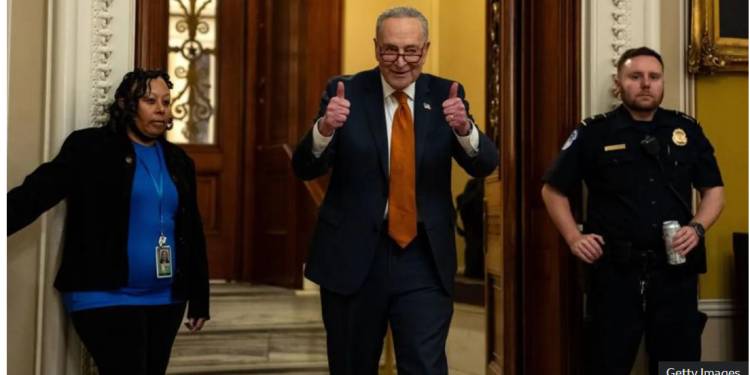US Averts Government Shutdown with Last-Minute Budget Deal
The United States narrowly avoided a federal government shutdown after the Senate and House of Representatives approved a last-minute budget deal. The legislation, passed by an overwhelming 85-11 margin in the Senate shortly after a midnight deadline, now awaits President Joe Biden's signature. The agreement prevents the first federal shutdown since 2019, which would have significantly disrupted public services and left millions of federal employees unpaid or furloughed.
This outcome marks a significant moment in U.S. politics, with bipartisan support securing the bill's passage despite strong opposition from influential figures, including President-elect Donald Trump. Trump, who takes office in January, had demanded the bill include provisions to increase the federal government’s borrowing capacity. However, lawmakers from both parties chose to proceed without this controversial addition.
The Stakes of a Shutdown
A government shutdown would have had far-reaching consequences, including the closure or severe reduction of services such as national parks, food assistance programs, and federally funded preschools. Disaster recovery efforts and aid-dependent farmers would have also faced critical delays. During the last shutdown in 2019—under Trump’s first term—federal operations were halted for 35 days, marking the longest such disruption in U.S. history.
The urgency of the situation prompted swift negotiations earlier in the week, but progress nearly collapsed when Trump and tech mogul Elon Musk encouraged Republicans to reject the proposed deal. Despite this, the final agreement, dubbed the “American Relief Act, 2025,†moved forward, stripping out contentious provisions from earlier drafts.
Key Provisions of the Budget Deal
The 118-page bill omits a debt-limit provision that Trump had advocated for, a sticking point for Democrats and fiscally conservative Republicans. It also removes several Democratic-backed measures, including healthcare reforms, funds to rebuild infrastructure like Baltimore’s collapsed bridge, and provisions aimed at regulating deceptive advertising in the hospitality industry.
However, the bill includes $100 billion in disaster relief funds to aid hurricane recovery and other natural disasters. Additionally, $10 billion has been allocated to support farmers, a move that underscores the agricultural sector's importance to the U.S. economy.
Political Drama Behind the Scenes
The intense budget negotiations revealed cracks within the Republican Party, particularly in the House of Representatives, where Speaker Mike Johnson faced criticism from some party members. Johnson, who spearheaded the negotiations, maintained close communication with both Trump and Musk throughout the process.
After the House passed the bill, Johnson defended his actions, stating, “We are grateful that everyone stood together to do the right thing. Having gotten this done now as the last order of business for the year, we are set up for a big and important new start in January.â€
Musk, who has been tasked with advising Trump on government spending in his upcoming administration, praised Johnson’s efforts in a post on his platform, X, saying, “The Speaker did a good job here, given the circumstances. It went from a bill that weighed pounds to a bill that weighed ounces.â€
Democrats, however, criticized Musk’s involvement, emphasizing that an unelected billionaire should not influence critical government decisions. This sentiment reflects broader concerns about the increasing influence of private individuals in public governance.
Implications for the Future
The successful passage of the budget deal offers a glimpse into the political tensions that could define Trump’s upcoming presidency. With Republicans set to control both chambers of Congress in January, legislative battles over spending, debt limits, and other critical issues are expected to intensify.
The recent negotiations also highlighted the limitations of Trump’s influence within his party. Despite his vocal opposition, many Republicans in the Senate and House prioritized bipartisan collaboration to avert a shutdown.
For now, the bill's passage brings relief to federal employees, public service beneficiaries, and disaster-stricken communities. However, the challenges ahead underscore the fragile state of U.S. politics as the nation braces for a new era of governance.
As the year concludes, lawmakers will look to January for what promises to be a politically charged period. With Trump’s administration on the horizon and the Republican Party poised for greater influence, the stakes for legislative harmony have never been higher.




No comments yet
Be the first to share your thoughts!